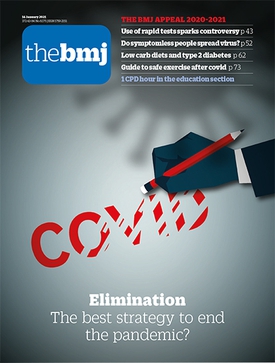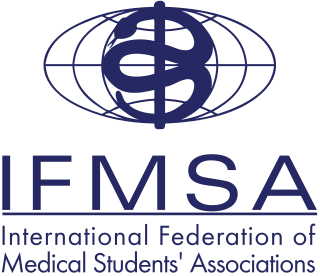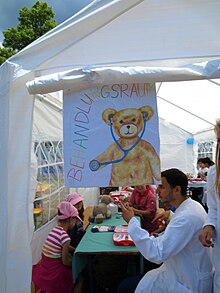
The BMJ is a weekly peer-reviewed medical journal, published by BMJ Group, which in turn is wholly-owned by the British Medical Association (BMA). The BMJ has editorial freedom from the BMA. It is one of the world's oldest general medical journals. Previously called the British Medical Journal, the title was officially shortened to BMJ in 1988, and then changed to The BMJ in 2014. The journal is published by BMJ Publishing Group Ltd, a subsidiary of the British Medical Association (BMA). The current editor-in-chief of The BMJ is Kamran Abbasi, who was appointed in January 2022.

A children's hospital(CH) is a hospital that offers its services exclusively to infants, children, adolescents, and young adults from birth up to until age 18, and through age 21 and older in the United States. In certain special cases, they may also treat adults. The number of children's hospitals proliferated in the 20th century, as pediatric medical and surgical specialties separated from internal medicine and adult surgical specialties.
Derek Summerfield is an honorary senior lecturer at London's Institute of Psychiatry and a member of the Executive Committee of Transcultural Special Interest Group at the Royal College of Psychiatry. He is also an Honorary Fellow of the Egyptian Psychiatric Association. He has published around 150 papers and has made other contributions in medical and social sciences literature.
Medical slang is the use of acronyms and informal terminology to describe patients, other healthcare personnel and medical concepts. Some terms are pejorative. In English, medical slang has entered popular culture via television hospital and forensic science dramas such as ER, House M.D., NCIS, Scrubs, and Grey's Anatomy, and through fiction, in books such as The House of God by Samuel Shem, Bodies by Jed Mercurio, and A Case of Need by Jeffery Hudson
Sir James Calvert Spence, & Bar was an English paediatrician who was a pioneer in the field of social paediatrics. He was a founding member of the British Paediatric Association.
In medicine, a case report is a detailed report of the symptoms, signs, diagnosis, treatment, and follow-up of an individual patient. Case reports may contain a demographic profile of the patient, but usually describe an unusual or novel occurrence. Some case reports also contain a literature review of other reported cases. Case reports are professional narratives that provide feedback on clinical practice guidelines and offer a framework for early signals of effectiveness, adverse events, and cost. They can be shared for medical, scientific, or educational purposes.

Barbara Mary Ansell, CBE, FRCP, FRCS was a British medical doctor and the founder of the field of paediatric rheumatology. Ansell was notable for outstanding contributions to the advancement of paediatric knowledge, specifically defining chronic joint disorders and the improvement of their management.

The International Federation of Medical Students' Associations (IFMSA) is a non-governmental organization representing associations of medical students. It was founded in May 1951 and currently maintains 139 member organizations from 130 countries around.
Charlotte Morrison Anderson AM FRACP FRCP FACP FRCPCH was an internationally renowned Australian scientist, physician and academic. She pioneered the field of paediatric gastroenterology working on health issues including cystic fibrosis and coeliac disease. She was the first woman professor of paediatrics in the United Kingdom.

Andrew Jeremy Wakefield is a British fraudster, discredited academic, anti-vaccine activist, and former physician.

An elective is a placement undertaken as part of a medical degree. The content and setting of the placement are largely decided by the student undertaking it, with some students choosing to spend it in a different country.
Norwich Medical School is a medical school based at the University of East Anglia, in Norwich, England. It is part of the Faculty of Medicine and Health sciences at the university. The first intake of students was in 2002. The school has a 5-year MBBS course, with the possibility of intercalation after year 3 or 4.
Hilary Dawn Cass is a British honorary physician in paediatric disability at the Evelina Hospital, part of Guy's and St Thomas' NHS Foundation Trust, and former president of the Royal College of Paediatrics and Child Health. She is known for establishing the UK's Rett Clinic for children with the neurodevelopmental disorder Rett syndrome, developing palliative care for children, and leading the Cass Review, completed in 2024.

Iona Caroline Heath is an English medical doctor and writer who was president of the Royal College of General Practitioners (RCGP) from 2009 to 2012.

Otto Herbert Wolff, was a German born medical scientist, paediatrician and was the Nuffield Professor of Child Health at Great Ormond Street Hospital. Wolff was notable for being one of the first paediatricians in Britain to set up a clinic for obese children. Later research into plasma lipids with Harold Salt pioneered the techniques of lipoprotein electrophoresis. He later conducted research into the role of lipid disturbance in childhood as a precursor of coronary artery disease and his recognition in 1960 of the rare condition of abetalipoproteinaemia. Wolff was also co-discoverer of the Edwards syndrome in abnormal chromosomes.
The Lancet MMR autism fraud centered on the publication in February 1998 of a fraudulent research paper titled "Ileal-lymphoid-nodular hyperplasia, non-specific colitis, and pervasive developmental disorder in children" in The Lancet. The paper, authored by now discredited and deregistered Andrew Wakefield, and twelve coauthors, falsely claimed causative links between the measles, mumps, and rubella (MMR) vaccine and colitis and between colitis and autism. The fraud was exposed in a lengthy Sunday Times investigation by reporter Brian Deer, resulting in the paper's retraction in February 2010 and Wakefield being struck off the UK medical register three months later. Wakefield reportedly stood to earn up to US$43 million per year selling diagnostic kits for a non-existent syndrome he claimed to have discovered. He also held a patent to a rival vaccine at the time, and he had been employed by a lawyer representing parents in lawsuits against vaccine producers.

A teaching hospital is a hospital or medical center that provides medical education and training to future and current health professionals. Teaching hospitals are almost always affiliated with one or more universities and are often co-located with medical schools.
Roopa Dhatt is an Indian American physician, an Assistant Professor and Internal Medicine Hospitalist at Georgetown University Medical Center, and at a community hospital, Washington, DC. In 2015 she co-founded Women in Global Health, which aims to reduce gender disparity among global health leaders, and subsequently became the organisation's Executive Director.









